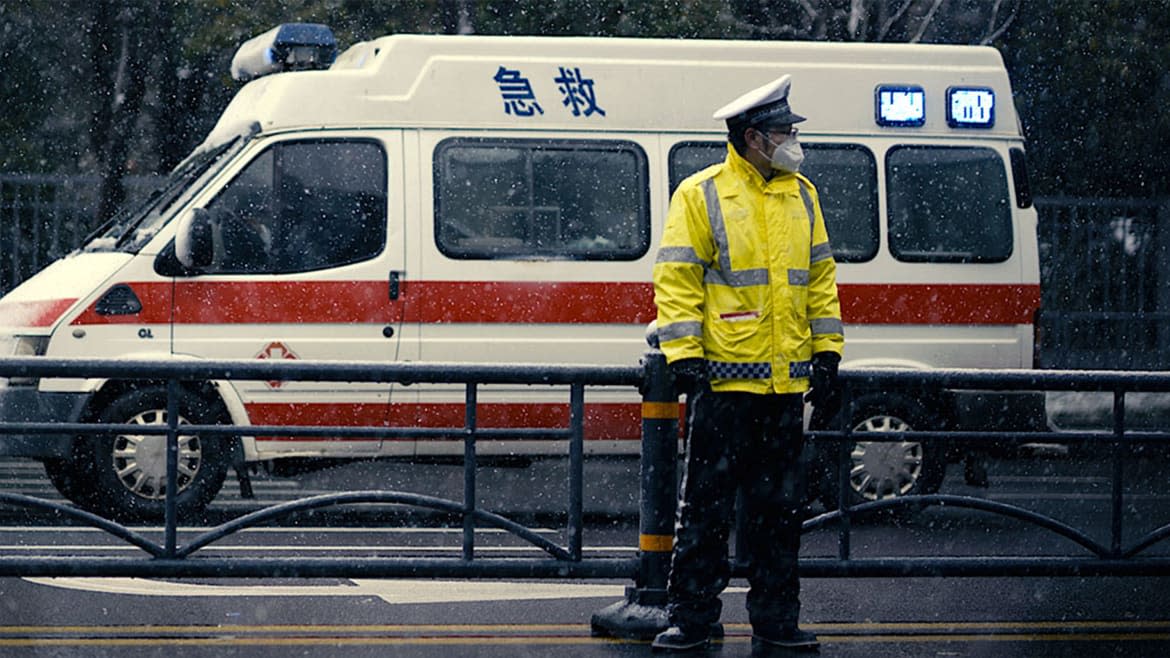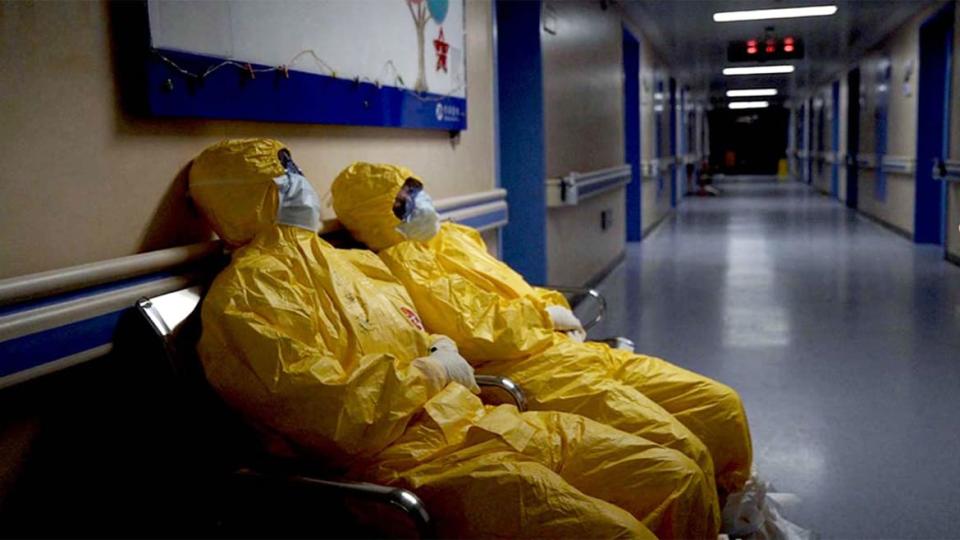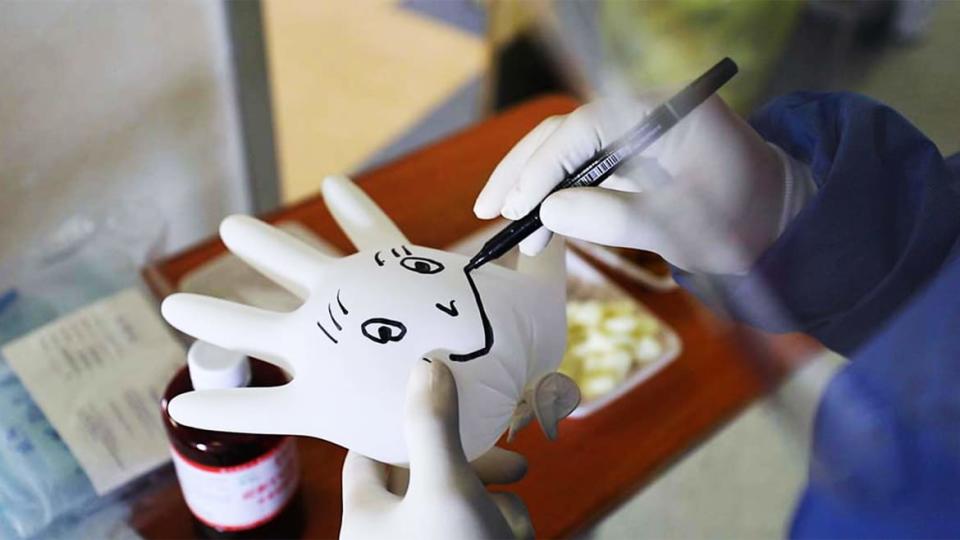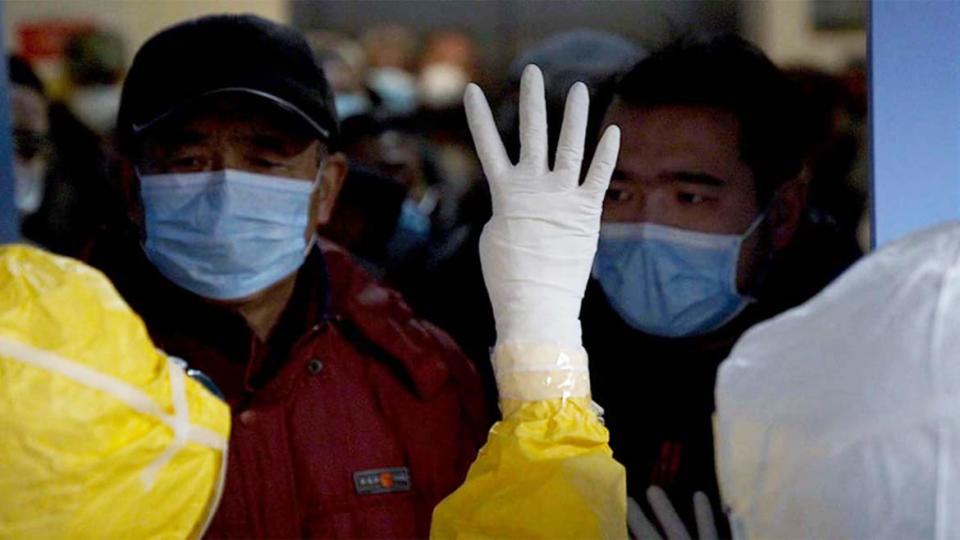The Real-Life Horror Film Set During Wuhan’s 76-Day COVID-19 Lockdown

In the first seconds of 76 Days, a shaky camera follows a group of hospital nurses sprinting down a hallway in a panicked rush. They’re almost indecipherable in their urgency, all wearing matching protective gear: chemical contamination bodysuits hooded over their head, their eyes barely visible through fogged goggles and face shields. Setting one woman apart in the tense scene is her piercing, devastated wail as their dash leads them to a closed hospital room door. “Papa!” she yells.
On the other side of the door, the woman’s father has just lost his battle with COVID-19. For her safety and for the good of the hospital, she can’t see him one last time, left only to scream, “Papa you’ll forever stay in my heart. Forever!” as he is wheeled past her in a body bag. Her colleagues both try to restrain her and calm her. She can’t let her grief compound the debilitating stress she and the rest of the workers are under. Her afternoon shift will soon start.
It is Jan. 23, the first day that China locked down Wuhan, the city of 11 million people that was ground zero for the global pandemic that is now approaching one million deaths. There is already a shortage of beds in the hospital, and staff’s only recourse for rejuvenation is to catnap on benches for minutes at a time when they can find them. This man has just freed another bed, and she will have much more work to do.
By the time 76 Days, a new documentary capturing with pulse-spiking immersion life inside Wuhan hospitals at the peak of the city's COVID-19 outbreak, premiered over the weekend at the Toronto International Film Festival, it had long since become cliché to describe the images it captures as if they were lifted from a dystopian thriller. But that doesn’t lessen the impact when you see them, a surreality that is still hard to stomach—especially stateside, where the harrowing battles are still not fantastical at all.
Directed by Hao Wu, Weixi Chen, and ‘Anonymous’ using footage captured from videographers and whistleblowers embedded inside four hospitals in Wuhan, the unsettling intimacy of that opening scene never relents. There are no talking heads or narration, just a cinema verité look inside the fight for survival. Medical professionals learn in real time what this disease is, and the patients themselves, in an area where the information pipeline was controlled by the government, begin to realize and confront the stakes involved.

Right away the human and emotional aspect of what happened in Wuhan is elucidated. This is a place that’s been a headline, a scapegoat, a political lightning rod, and the source of data, tracing charts, and statistics, all of which have desensitized too many people from the intense loss and tragedy at the root of all that conversation. 76 Days immediately recenters the emotional discourse, at least, around the gravity of that.
The title alone—76 Days—is powerful. Wuhan was ground zero of this thing, yet their shutdown only lasted 76 days. The city has been on its reopening trajectory for months. In August, images emerged from a massive pool party in the city as the virus transmission rate hovered near zero. Meanwhile the United States, a country whose government patronizingly uses the city’s name like a slur, is in its seventh month of various shutdown measures and, as cases continue to spike, the 200,000th virus-related death is imminent.
Wu captained the directing team from the United States, where he sifted through footage sent to him from filmmakers on the ground in Wuhan. There have already been attempts at documenting the grander social stories and lessons about the pandemic, which makes the approach here already indelible. Here is an unfiltered and specific look at 76 days in the city where it started as medical professionals worked doggedly to contain things.
The developing story was so new when Wu began work on the film that he didn’t know who to follow for the best story: what patients would survive, what doctors and nurses would be compelling, or whether volunteers and workers outside the hospitals could add to the narrative. As such the presence of “characters”—a handful of nurses and patients—over the course of the documentary are weighted in some parts and less so in others; it wasn’t until editing that Wu knew what strings of footage would be worth exploring.

Early on we follow the gatekeeper, trying her best to control the crowd attempting to break down the hospital door in order to be treated.
An elderly husband and wife are both admitted but required to be in separate rooms, desperate for updates on each other’s conditions as they can’t see each other.
There’s a “grandpa” with dementia who can’t grasp what’s going on and keeps trying to escape the hospital.
A pregnant woman who may have had COVID gives birth and is forced to quarantine for two weeks before being allowed to see her baby.
One orderly who forged a special connection with a patient grieves as her condition deteriorates and she can no longer sense his presence.
A nurse makes a point to carefully catalog every phone, wallet, and personal effect of the dead so that, once the shutdown is over and it is safe again, she can return them herself to the families who weren’t able to so much as say goodbye to their loved ones.

By centering the human emotion within this hospital, 76 Days finds a focus amid the cacophony of a story that is almost too big to tell. Because of this, the film manages to exist removed from the loud politicization and moralizing surrounding the pandemic. Instead, you carry that outside knowledge with you when you watch, which should surface a range of reactions to the film.
Aside from the trauma and inescapable heartache of what you’re witnessing, what may stick with you is the sense that, while the work is hard and painful, overall it’s effective. You see over time as the doctors and patients’ spirits seem a bit lighter, the doom begins to lift. Yes, it’s frustrating and there are setbacks, but doing everything right, it turns out, actually works.
As optimistic as things seem at the end, there is a sobering, though tender reminder of the loss at the center of this. Hope and inspiration can’t overshadow the reality of the loss, fear, and sadness that has defined this era of our lives—and certainly those of the dead.
There is a palpable sense of how the dead are valued in Wuhan. Here, they are the subject of political posturing and conspiracy theories. And here, the crisis rolls on past 180 days.
Get our top stories in your inbox every day. Sign up now!
Daily Beast Membership: Beast Inside goes deeper on the stories that matter to you. Learn more.


